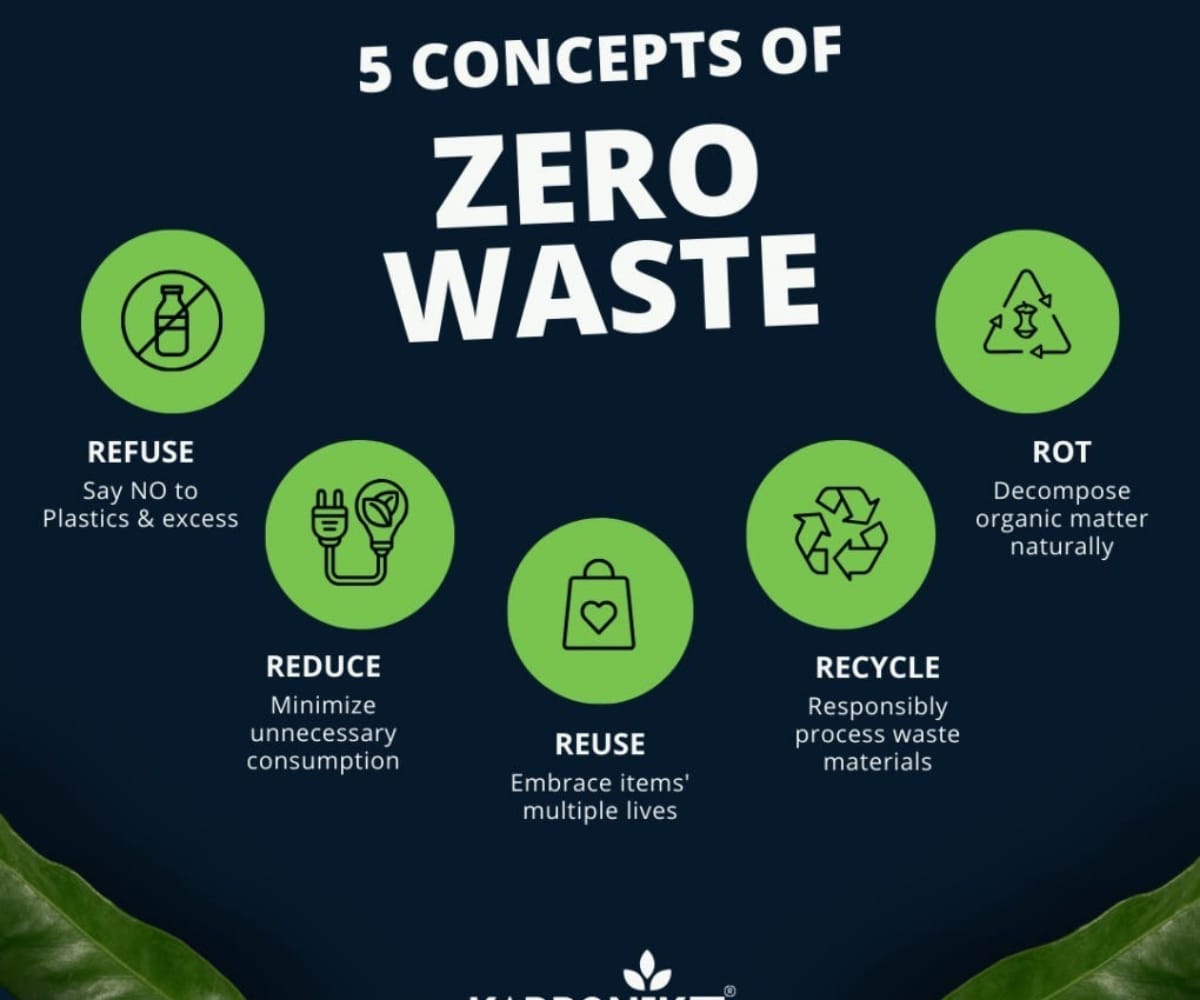Zero Waste Lifestyle : A Comprehensive Guide to Living Sustainably
Zero-Waste Lifestyle Introduction
Define A waste lifestyle
Zero-waste living involves reducing, reusing, and recycling. The idea is to reuse or recycle everything to avoid landfills.

Philosophy of Zero Waste Lifestyle
Zero-waste advocates a closed-loop system that eliminates waste. We must rethink production and consumption and prioritize sustainability and resource efficiency. Making thoughtful choices that benefit society and the environment.
The History of Zero Waste Lifestyle
Zero waste ideas are not new, but the present movement has grown. Due to need, societies practiced zero-waste methods including composting and ingenuity.
Benefits of Zero-Waste Living
Environmental Impact
Environmental benefits are the biggest advantage of zero-waste living. Waste reduction helps landfills, reduces pollution, and conserves natural resources. This improves the environment and the future.
Financial Savings
Zero waste may save you a lot of money. Cutting wasteful expenditures and buying lasting things saves money over time. purchasing excellent, reusable things is cheaper than purchasing throwaway ones.
Personal Wellness
A zero-waste lifestyle may boost self-esteem by giving you a feeling of purpose. Decluttering and simplifying may decrease stress and improve waste management.
Zero-waste living principles
Refuse, Reduce, Reuse, Recycle, Rot The 5 R’s underpin the zero-waste movement. Each waste management concept urges consumers to reassess their purchasing behaviors.
Knowing Each Principle
-
Refuse:
Avoid unnecessary things that add to trash. This includes eliminating single-use plastics and unneeded gifts.
-
Reduce
waste by simplifying life and prioritizing quality over quantity. This may entail downsizing or saving energy.
-
Reuse:
Reuse and repurpose things to extend their lifespan. Use reusable bags, containers, and more to reduce trash.
-
Recycle:
Sort and dispose of recyclable items. Clean and sort objects according to local recycling standards.
-
Manage organic
Waste via composting. This enhances soil and lowers landfill garbage.
Comparing Needs and Wants
Consider if a buy is necessary or temporary. This encourages sustainable decisions and discourages impulsive buying.
Avoiding Single-use plastics
Straws, cutlery, and bags are major trash producers. Use cloth bags and stainless steel straws.
Reducing waste
Waste reduction requires intentional choices. Minimalist lifestyles and choices may do this. Minimalist Living Declutter and keep what you need to live. This cuts waste and simplifies life.
Options
Select items.
Choose items with the smallest packaging or sustainable materials.
Reuse: Increasing Product Life
Reusing extends the life of existing goods by finding new uses. This includes upcycling, repurposing, and purchasing used.
Recycling and Upcycling
Make new, useful things from old ones. Use old garments as cleaning cloths or glass jars as storage containers.
Cheap Shopping
Secondhand things decrease waste and new product demand. Quality products are available in thrift shops and online secondhand markets.

Recycling: Waste Sorting
Recycling keeps items out of landfills and creates new products. Understanding recycling standards and segregation is essential.
Recycling Basics
Discover local recycling restrictions. Clean and sort recyclables for proper processing.
Managing Organic Waste
Composting organic waste enriches soil through rotting. This cuts landfill waste. To compost at home, consider installing a system in your backyard or using a compost bin. This improves food and yard waste management.
Benefits of Organic Waste
Composting reduces waste and enriches soil, promoting plant growth.
Zero Waste Different Life Areas
Home: Zero-Waste Kitchen and Living Room
Start with the living room and kitchen for zero-waste living. Use reusables, reduce packaging, and recycle.
Sustainable Beauty and Hygiene
Sustainable personal care involves using products and reducing waste. These include reusable razors, biodegradable toothbrushes, and natural cosmetic goods.
Sustainable Eating and Food Waste Reduction
Plan meals, use leftovers, and compost food scraps to reduce food waste. Choose seasonal and local foods to eat.
Zero-waste shopping Grocery Shop and Pack
Bring your containers and bags to shop waste-free. Choose bulk and low-packaging goods to decrease waste.
Tips for Overcoming Obstacles
Start small, educate yourself, and get help from zero-waste networks to overcome problems. Change your lifestyle and rejoice.
Community Help and Resources
Join local or online zero-waste organizations for support and resources. Sharing advice and experiences may inspire and help.
Success Stories and Case Studies
Actual Zero-Waste People
Discover zero-waste success stories. Discover useful advice for your travel from their experiences.

Summary
Zero-waste living improves personal and financial wellness while promoting environmental sustainability. Reject, reduce, reuse, recycle, and rot minimize rubbish and extend life. Despite hurdles, zero waste is worth the effort with community support. Every single action adds up, and people and communities can make a difference. When starting your zero-waste path, remember that progress is more important than perfection. Every waste reduction initiative, big or small, helps the world and the future.
FAQs
-
What’s the hardest about becoming zero-waste?
The toughest elements are convenience, finding affordable zero-waste things, and altering habits. Implementing tiny adjustments helps ease the transition.
-
How can I reduce waste in my everyday life?
Start with your kitchen or bathroom. Choose reusable things, avoid single-use plastics, and recycle and compost. Gradual adjustments are durable and manageable.
-
Are zero-waste items costlier?
Zero-waste items may cost more upfront, but they last longer and save money. A good reusable water bottle or linen shopping bag might save money over disposable ones.
-
How can I get my family to become zero waste?
Make zero-waste living a family aim. Share the advantages, adopt adjustments, and celebrate accomplishments as a family. Create a supportive, motivated home by encouraging open communication and setting an example.
-
What are zero-waste swaps?
Do not use liquid soap. Instead, use bags, water bottles, bamboo toothbrushes, and bar soap that you can reuse. These easy improvements decrease waste and are ideal for beginners.

